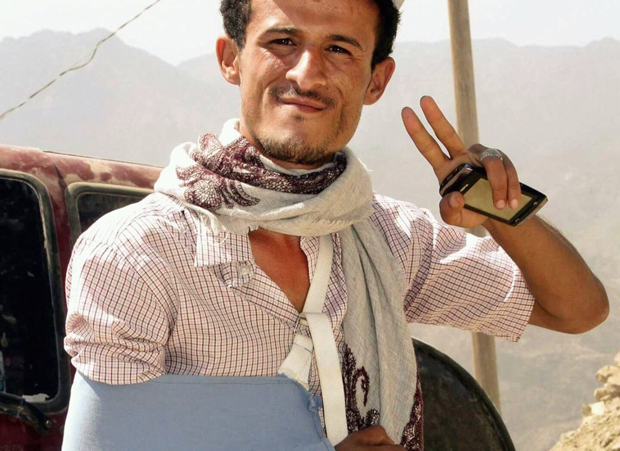[vc_row][vc_column][vc_column_text]

Yemeni journalist Abdulaziz Muhammad al-Sabri wears a sling after he was shot by a sniper in 2015
[/vc_column_text][/vc_column][/vc_row][vc_row][vc_column][vc_custom_heading text=”Yemeni journalist Abdulaziz Muhammad al-Sabri details the dangers of reporting in his country. Interview by Laura Silvia Battaglia”][/vc_column][/vc_row][vc_row][vc_column][vc_column_text]
Abdulaziz Muhammad al-Sabri is smiling, despite everything. But he cannot fail to feel depressed when he sees the photos taken a few months ago, in which he is holding a telephoto lens or setting up a video camera on a tripod: “The Houthis confiscated these from me. They confiscated all my equipment. Even if I wanted to continue working, I wouldn’t be able to.”
Al-Sabri is a Yemeni journalist, filmmaker and cameraman, and a native of Taiz, the city that was briefly the bloodiest frontline in the country’s civil war. He has worked in the worst hotspots, supplying original material to international media like Reuters and Sky News. “I have always liked working in the field,” he said, “and I was really doing good work from the start of the 2011 revolution.”
But since the beginning of the war, the working environment for Yemeni journalists has progressively deteriorated. In the most recent case, veteran journalist Yahia Abdulraqeeb al-Jubaihi faced a trial behind closed doors and was sentenced to death after he published stories critical of Yemen’s Houthi rebels. Many journalists have disappeared or been detained, and media outlets closed, in the past few years.
“The media industry and those who work in Yemen are coming up against a war machine which slams every door in our faces, and which controls all the local and international media bureaus. Attacks and assaults against us have affected 80% of the people employed in these professions, without counting the journalists who have already been killed, and there have been around 160 cases of assaults, attacks and kidnappings. Many journalists have had to leave the country to save their lives. Like my very dear friend Hamdan al-Bukari, who was working for Al-Jazeera in Taiz.”
Al-Sabri wanted to tell his story to Index on Censorship without leaving out details “because there is nothing left for us to do here except to denounce what is going on, even if nobody is listening to us”. He spoke of systematic intimidation by the Houthi militias in his area against journalists in general, and in particular against those who work for the international media: “In Taiz they have even used us as human shields. Many colleagues have been taken to arms depots, which are under attack from the [Saudi-led, government-allied] coalition, so that once the military target has been hit, the coalition can be accused of killing journalists.”
[/vc_column_text][/vc_column][/vc_row][vc_row][vc_column width=”1/4″][vc_icon icon_fontawesome=”fa fa-quote-left” color=”custom” align=”right” custom_color=”#dd3333″][/vc_column][vc_column width=”3/4″][vc_custom_heading text=”In Taiz they have even used us as human shields” google_fonts=”font_family:Libre%20Baskerville%3Aregular%2Citalic%2C700|font_style:400%20italic%3A400%3Aitalic”][/vc_column][/vc_row][vc_row][vc_column][vc_column_text]
This sort of intimidation is one of the reasons why researching and reporting on the conflict is very difficult. “In Taiz and in the north, apart from those working for al-Masirah, the Houthis’ TV station, and the pro-Iranian channels, al-Manar and al-Alam, only a few other journalists are able to work from here, and those few, local and international, are putting their necks on the line,” said al-Sabri.
“You’re lucky if you can make it, otherwise you fall victim to a bullet from the militias, attacks, kidnappings. Foreigners are unable even to obtain visas because of the limitations imposed by [Abdrabbuh Mansour] Hadi’s government and the coalition. The official excuse is that the government ‘fears’ for their lives, since if they were kidnapped, imprisoned or died in a coalition bombardment, it would be the Yemeni government’s responsibility.”
Al-Sabri has personal experience of the violence against journalists in Yemen. In December 2015, he was wounded in the shoulder by a sniper who was aiming at his head. On another occasion, he was kidnapped, held at a secret location for 15 days, blindfolded, threatened with death and tortured.
The full article by Laura Silvia Battaglia is available with a print or online subscription.
[/vc_column_text][/vc_column][/vc_row][vc_row][vc_column][vc_column_text]
Award-winning journalist Laura Silvia Battaglia reports regularly from Yemen. Translated by Sue Copeland.
This article is published in full in the Summer 2017 issue of Index on Censorship magazine. Print copies of the magazine are available on Amazon, or you can find information about print or digital subscriptions here. Copies are also available at the BFI, the Serpentine Gallery, MagCulture, (London), News from Nowhere (Liverpool), and Home (Manchester). Each magazine sale helps Index on Censorship continue its fight for free expression worldwide.
[/vc_column_text][/vc_column][/vc_row][vc_row][vc_column][vc_custom_heading text=”From the Archives”][vc_row_inner][vc_column_inner width=”1/3″][vc_single_image image=”80562″ img_size=”213×289″ alignment=”center” onclick=”custom_link” link=”http://journals.sagepub.com/doi/pdf/10.1177/0306422014550963″][vc_custom_heading text=”The future of Yemeni journalists” font_container=”tag:p|font_size:24|text_align:left” link=”url:http%3A%2F%2Fjournals.sagepub.com%2Fdoi%2Fpdf%2F10.1177%2F0306422014550963|||”][vc_column_text]September 2014
The Yemeni government should not be the ones judging the objectivity of reporting, but there is hope for more freedom.[/vc_column_text][/vc_column_inner][vc_column_inner width=”1/3″][vc_single_image image=”80569″ img_size=”213×289″ alignment=”center” onclick=”custom_link” link=”http://journals.sagepub.com/doi/pdf/10.1177/0306422016657007″][vc_custom_heading text=”Journalists face increasing threats” font_container=”tag:p|font_size:24|text_align:left” link=”url:http%3A%2F%2Fjournals.sagepub.com%2Fdoi%2Fpdf%2F10.1177%2F0306422016657007|||”][vc_column_text]June 2016
Rachael Jolley explains why journalists around the world, especially near the Middle East, are facing increasing threats.[/vc_column_text][/vc_column_inner][vc_column_inner width=”1/3″][vc_single_image image=”80562″ img_size=”213×289″ alignment=”center” onclick=”custom_link” link=”http://journals.sagepub.com/doi/pdf/10.1177/0306422014548392″][vc_custom_heading text=”Journalists should ignore technology” font_container=”tag:p|font_size:24|text_align:left” link=”url:http%3A%2F%2Fjournals.sagepub.com%2Fdoi%2Fpdf%2F10.1177%2F0306422014548392|||”][vc_column_text]September 2014
Journalists in war zones may need to ignore technology and go back to old ways to avoiding surveillance, says Iona Craig.[/vc_column_text][/vc_column_inner][/vc_row_inner][vc_separator][/vc_column][/vc_row][vc_row content_placement=”top”][vc_column width=”1/3″][vc_custom_heading text=”100 Years On” font_container=”tag:p|font_size:24|text_align:left” link=”url:https%3A%2F%2Fwww.indexoncensorship.org%2F2017%2F06%2F100-years-on%2F|||”][vc_column_text]Through a range of in-depth reporting, interviews and illustrations, the summer 2017 issue of Index on Censorship magazine explores how the consequences of the 1917 Russian Revolution still affect freedoms today, in Russia and around the world.
With: Andrei Arkhangelsky, BG Muhn, Nina Khrushcheva[/vc_column_text][/vc_column][vc_column width=”1/3″][vc_single_image image=”91220″ img_size=”medium” alignment=”center” onclick=”custom_link” link=”https://www.indexoncensorship.org/2017/06/100-years-on/”][/vc_column][vc_column width=”1/3″ css=”.vc_custom_1481888488328{padding-bottom: 50px !important;}”][vc_custom_heading text=”Subscribe” font_container=”tag:p|font_size:24|text_align:left” link=”url:https%3A%2F%2Fwww.indexoncensorship.org%2Fsubscribe%2F|||”][vc_column_text]In print, online. In your mailbox, on your iPad.
Subscription options from £18 or just £1.49 in the App Store for a digital issue.
Every subscriber helps support Index on Censorship’s projects around the world.
![]() SUBSCRIBE NOW[/vc_column_text][/vc_column][/vc_row]
SUBSCRIBE NOW[/vc_column_text][/vc_column][/vc_row]












